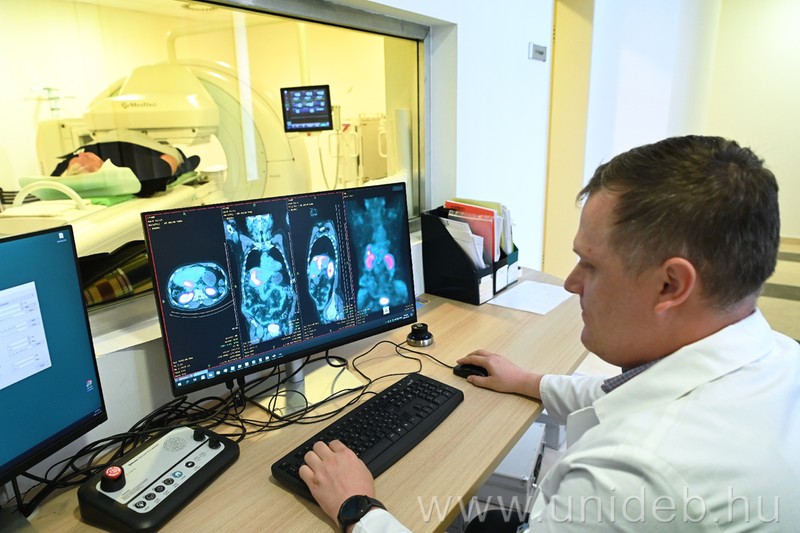The new isotope treatment, previously only used in a few European institutes, has been available at the Clinical Center of the University of Debrecen for a year. Since last May, 13 patients with neuroendocrine tumors have been treated in Debrecen with the new procedure. Lutathera treatment is an effective treatment for late-discovered, metastasized tumors, and patients’ lives can be significantly extended with its use, writes unideb.hu.
At the Department of Internal Medicine of the Clinical Center of the University of Debrecen, more and more patients are treated with tumoral lesions originating from neuroendocrine cells. Tumors most often develop in the gastrointestinal tract and pancreas, as well as in the mucous membrane of the bronchial system, but they can arise in almost any organ.
If the tumor cannot be removed by surgery, it can be effectively treated with special drugs. However, in many cases, 7-10 years can pass between the onset of the disease and the appearance of the first symptoms (e.g. diarrhea, sudden weight loss, weakness), so the patient comes to the doctor late, when metastases have already formed in several organs. In this case, radioisotope therapy can be an effective treatment.
Neuroendocrine tumors most often metastasize to the lymph nodes, liver, bones, and lungs. The so-called Lutathera treatment is a very effective therapy for late-discovered, metastasized tumors. This can stop the growth of the tumor and make it possible for the tumor to regress. With the treatment, patients’ lives can be significantly extended – Associate Professor Miklós Bodor
– said the head of the Endocrinology Department of the Internal Medicine Clinic of the UD Clinical Center.
The new procedure was used for the first time in Hungary at the Clinical Center of the University of Debrecen and Semmelweis University in May 2022. The treatment was previously only available in a few European centers. At the University of Debrecen, 13 patients were treated with Lutathera in the past year. The treatment is based on the fact that the cells of the neuroendocrine tumor contain a special protein that is absent, or only in very small amounts, on healthy, non-cancerous cells. During the treatment, the patient receives 177Lu-oxooctreotide, which binds only to this one protein, thus only to the tumor cells, and the excess leaves the patient’s body in the urine. The preparation contains a radiant, radioactive material, which after binding shrinks or destroys the tumor and its metastases with its local radiation. The treatment requires a special background, instrumentation and expertise, which is available at the Clinical Center.
After using state-of-the-art imaging equipment, we have verified that there are receptors on the surface of the tumor to which the radioactive substance can bind, an one team decides whether the patient is suitable for treatment. During the therapy, the radioactive material is given to the patient in an infusion, which reaches the surface of the tumor cells with the help of the bloodstream. The radiation that destroys malignant tissue thus exerts its effect directly in the tumor, which can lead to effective treatment even in metastatic cases
– explained Ildikó Garai, nuclear medicine specialist at the Medical Imaging Clinic of the UD Clinical Center, associate professor at the Department of Nuclear Medicine.
The intervention is carried out by a professional team of specialists and specially trained medical personnel in the Nuclear Medicine building. After the treatment, SPECT/CT is used to check whether the tumor has really taken up the therapeutic product. During the treatment, the patient is isolated in accordance with radiation protection rules. The therapy can be repeated, a series is usually given every 8 weeks, consisting of a total of 4 treatments. The treatment is well tolerated by patients without side effects, and they can leave the institution after a 24-hour observation in a special room.
Specialists are working to introduce effective, innovative treatment based on a similar principle in the treatment of other types of tumors, such as prostate cancer, at the Clinical Center of the University of Debrecen.


















